
M.S. Project Defense: Alexey Malyshev
Wednesday, April 14, 2021
9:00 AM
Zoom: https://unl.zoom.us/j/92677186128
Title: "Towards a Machine Learning based Generalizable Framework for Detecting COVID-19 Misinformation on Social Media"
Abstract: Discovering Program Invariants Using Static and Dynamic Analysis Techniques
Being able to detect program invariants-relations can help identify security vulnerabilities such as DoS attacks and side-channel information leakage as well as improves software quality by preventing software from failures. In this work, we propose two approaches in discovering program invariants. The first is a new dynamic analysis approach for learning recurrence relations to capture complexity bounds for recursive programs. The second is an extension (MIRAI+OCT) of the existing abstract interpretation tool for Rust programming language (MIRAI) with a relational abstract domain - the octagon domain. Preliminary results on several popular recursive programs show that we can learn precise recurrences capturing worst-case complexity bounds such as O(n log(n)) or O(cn). Also, compared to MIRAI, our extension MIRAI+OCT is able to improve the precision of the analysis, and, as a result, reduce false positives.
Committee Members:
Dr. ThanhVu Nguyen
Dr. Hamid Bagheri
Dr. Witawas Srisa-An
Ph.D. Defense: Baofeng Zhou
Wednesday, April 14, 2021
2:30 PM
Zoom link: https://unl.zoom.us/j/98216867042
Meeting ID: 982 1686 7042
Title: “Energy-Efficient, Environment-Aware Synchronization and Connectivity for the Internet of Things”
Abstract: With the recent proliferation of the Internet of Things (IoT) in many applications, the importance of providing reliable wireless connectivity and network coordination receives increasing attention. A growing number of IoT devices are deployed in diverse physical environments for distinct needs, causing the performance of wireless networking techniques subject to environmental factors and energy conservation considerations. Moreover, many existing solutions are developed under the assumption that the network and the environment are homogeneous, which underscore the need for energy-efficient and environment-aware wireless networking solutions for heterogeneous IoT.
In this dissertation, two wireless networking problems are studied: (1) Energy-efficient and environment-aware network synchronization for heterogeneous IoT. Synchronization is a fundamental building block of wireless networks. The research in this dissertation aims to provide holistic approaches to address the energy efficiency issue and the impact of environmental factors on the performance of synchronization mechanisms. First, a timestamp-free syntonization mechanism is developed to mitigate the impact of communication delays in the network. Also, a correlation-based network synchronization protocol that leverages temperature information to synchronize correlated clusters is designed. A scheduling framework is developed to optimize the overhead of network synchronization. In addition, the concept of network time connectivity is introduced as a network-level synchronization performance metric. (2) Long-range, environment-aware wireless underground communication techniques. Internet of Underground Things is an enabling technology for applications such as precision agriculture and underground infrastructure monitoring. Underground communication performance is affected by environmental factors, i.e., soil properties, including soil moisture, soil type, and soil bulk density. A long-range communication technique is evaluated in an underground communication testbed to study the impact of soil parameters on the performance of the technique.
Bio: Baofeng Zhou received his B.E. in Electronic Information Science and Technology from the School of Electronic Engineering, Beijing University of Posts and Telecommunications, Beijing, China, in 2015. Currently, he is a graduate research assistant and pursuing his Ph.D. degree in Computer Engineering in the Cyber-Physical Networking Laboratory, Department of Computer Science and Engineering, University of Nebraska-Lincoln, Lincoln, NE, under the guidance of Professor Mehmet Can Vuran. His current research interests include the Internet of Things, agricultural IoT, wireless underground communications, and advanced clock synchronization for IoT.
Committee members:
Professor Mehmet Can Vuran (Chair)
Professor Marilyn Wolf
Professor Lisong Xu
Professor Michael Hoffman
Defense: Jun Sun
Monday, April 19, 2021
1:00 PM
Zoom
Defense: Roland Madidjim
Monday, April 19, 2021
1:00 PM
Zoom